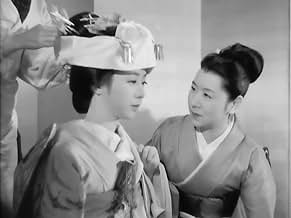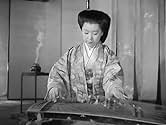अपनी भाषा में प्लॉट जोड़ेंShinnosuke is introduced to Shizu as a prospective wife, but he falls in love with her widowed sister Oyu. Convention forbids Oyu to marry because she has to raise her son as the head of her... सभी पढ़ेंShinnosuke is introduced to Shizu as a prospective wife, but he falls in love with her widowed sister Oyu. Convention forbids Oyu to marry because she has to raise her son as the head of her husband's family. Oyu convinces Shinnosuke and Shizu to marry so that she can remain clos... सभी पढ़ेंShinnosuke is introduced to Shizu as a prospective wife, but he falls in love with her widowed sister Oyu. Convention forbids Oyu to marry because she has to raise her son as the head of her husband's family. Oyu convinces Shinnosuke and Shizu to marry so that she can remain close to Shinnosuke.
फ़ीचर्ड समीक्षाएं
The main topic of the movie is forbidden love, and more generally the impossibility of being happy in this world, which are very characteristic themes in Kenji Mizoguchi's films. The film illustrates also some typical aspects of J. Tanizaki's work, like the 'physical' (facial) influence of a mother on the future emotional life of her son, or the fear of scandal and of losing one's face in society.
This film shines through the purity and the intensity of the emotions of the protagonists (hidden for a long time, they erupt violently), through the marvelous performances of the actors and through its forceful message about the all importance of love. A must see.
Kenji Mizoguchi's movie is not one of his great movies, but it is an impeccably executed bit of soap opera. All three principals are aware of each other's feelings, and nothing is said. When Miss Tanaka's son dies, she is thrust from her home, her brother will not take her in, nor can she move in with her sister -- the gossip would only increase.
As I said, it's not one of Mizoguchi's major works, but that doesn't mean he did a shoddy job; he seemed incapable of that. The last two shots, with their subjective cameras, are heartbreaking.
There's really not much to say about the technical aspects in this film, if you know Mizoguchi's directing you know you're in good hands. Anyway though, as usual, the scenes are beautifully shot. I even found myself really liking the music here, it adds perfectly to the atmosphere.
Overall, this is another another great film from Mizoguchi that's worth the time.
In Western style movies this love triangle would be all about trickery and deceit. In this Japanese film it is all about self sacrifice. The wife knows very well that her husband doesn't love her but wants to allow her sister a sexual relationship. A relationship that tradition denies to a widow with children.
The only Western film that vaguely resembles "Miss Oyu" in the treatment of a love triangle is part 9 of the "Dekalog" (1989, Krzysztof Kieslowski) in which an impotent man encourages his wife to take a lover. In this film self sacrifice ex ante does not preclude jealousy ex post. Also in "Miss Oyu" self sacrifice has its price.
"Miss Oyu" is based on a story by Junichiro Tanizaki and directed by Kenji Mizoguchi. Given these two big names one would expect a film of high quality. "Miss Oyu" is however at times very sentimental.
The reason probably is that "Miss Oyu" is the first film Mizoguchi made for the Daiei studio and the Daiei studio needed a commercial success very badly. By the term "studio system" everybody thinks of Hollywood, but the studio system in Japan worked more or less the same. When you were a renowned director, as Mizoguchi was, you were allowed to make one film for the sudio and one film according to your own artistic interest. "Miss Oyu" was for the studio.
क्या आपको पता है
- कनेक्शनReferenced in Aru eiga-kantoku no shôgai (1975)
टॉप पसंद
विवरण
बॉक्स ऑफ़िस
- दुनिया भर में सकल
- $5,020
- चलने की अवधि1 घंटा 34 मिनट
- रंग
- ध्वनि मिश्रण
- पक्ष अनुपात
- 1.37 : 1
इस पेज में योगदान दें


























